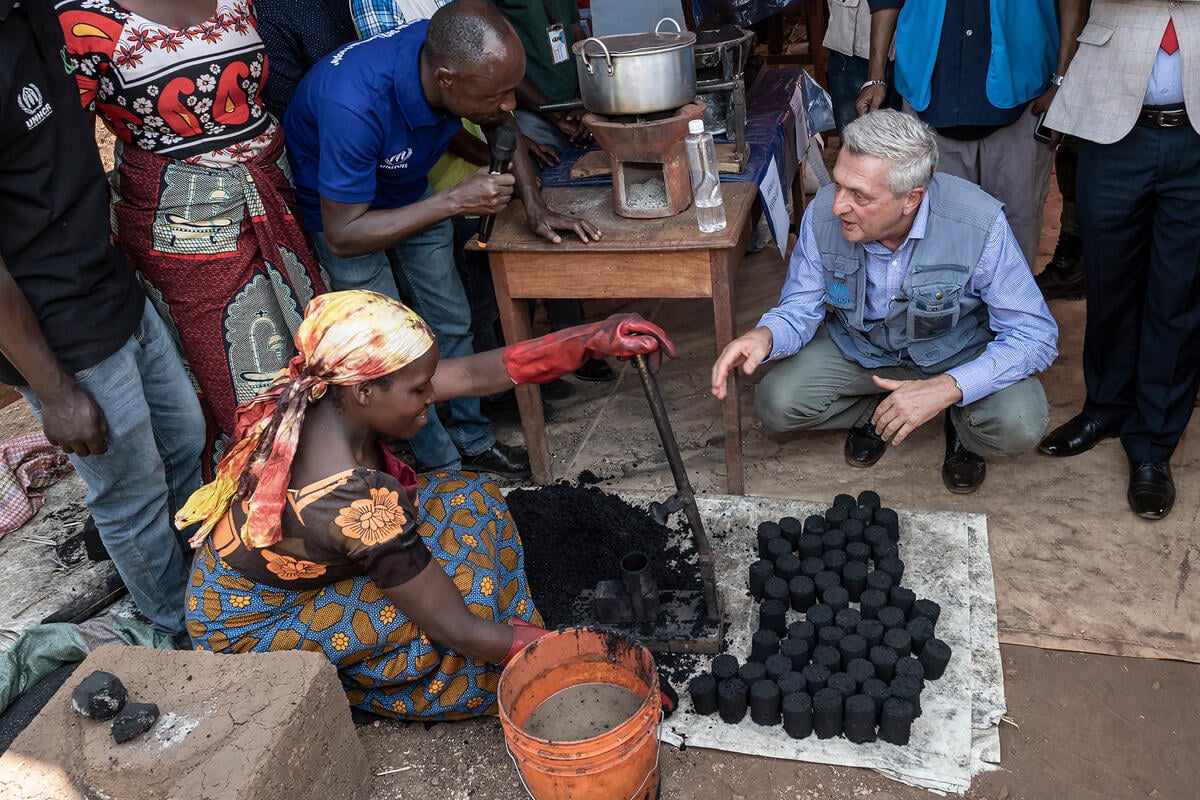Burundian refugees face challenges of identity, land ownership on return
Burundian refugees face challenges of identity, land ownership on return

RUMONGE, Burundi, August 28 (UNHCR) - The case of Philemon Nyandwi epitomises the dilemma faced by many of the tens of thousands of Burundian refugees heading to their homeland after years of exile in Tanzania.
Nyandwi's parents were Burundian, but he was born in a Tanzanian refugee camp and had never stepped foot in his homeland until last year. He also speaks English and Swahili, the languages spoken in Tanzania, rather than the French and Kirundi used in Burundi.
"In Tanzania, they said we were Burundians. Here in Burundi, they say we are Tanzanians.... We are seen as strangers, we feel like strangers," says Philemon Nyandwi, who was born after his late parents fled across the border with hundreds of thousands of others to escape genocidal massacres in 1972.
The problems that Nyandwi has faced since following tens of thousands of other refugees back to the country last year are just one example of the big challenges facing those returnees who fled Burundi in 1972 - some 60,000 since the Burundian government signed a peace agreement with rebel factions in 2000.
These challenges - including identity, language skills, and land ownership - are particularly acute for people who fled overseas to escape the first major surge of violence in 1972, and for children born in Tanzania. Those who took part in a second exodus from 1993 to 1996 have generally faced easier reintegration because most found their land vacant upon return.
The government has said it plans to distribute thousands of hectares of land to returnees. But it has yet to draw up guidelines for apportioning the land, which UNHCR helped to identify.
Despite the problems Nyandwi faces, he is determined to make a go of things and help rebuild a country devastated by three decades of ethnic strife. He and like-minded former refugees set up the Union of Burundian Returnees in June to give them a voice, promote the skills they acquired abroad and show the government that they have something to offer.
For the moment, Nyandwi hopes for reintegration assistance and a parcel of land from the government in southern Burundi's Rumonge district before he returns to Tanzania's Katumba settlement to pick up his family. "If you saw where I sleep, you would understand why I am glad I didn't come here with my four children. My room is just big enough to allow me to lie down," says Nyandwi.
Barnabas Kiromezi, who returned to Burundi in 2005, faces similar problems of identity. Unlike Nyandwi, he was born in Burundi but fled to Tanzania when he was a child and grew up learning English and Swahili. He took a degree in international relations and diplomacy while in Tanzania and hoped to be able to use his expertise to help reconstruct his homeland.
Things have not worked out to plan. "Despite my diplomas, I could not work in Tanzania because employment opportunities were extremely limited for refugees. Now, I can not find a job here: I don't even speak the language," he says.
But even those who were born in Burundi and speak the language are facing problems on their return. Juma Misigaro, 72, decided to return with his wife and two oldest children in January after 34 years in exile. He had no problem finding his old home in Rumonge, but a shock awaited him - another family had moved onto the land years before, while others were making money from his oil palms.
Misigaro was determined to fight back despite the hardship - he lives in a rudimentary shelter and farms someone else's land for a pittance. Life was much better in Tanzania, he says, while insisting: "I will not return to Tanzania. I want my house back. I want my land back."
He went to see the African Centre for the Constructive Resolution of Disputes (ACCORD), a UNHCR partner which has been helping refugees reintegrate in the Rumonge area since 2004. The South Africa-based group specialises in arbitration of land disputes and has successfully mediated 145 disputes here, but more than double that number have gone to court.
The head of ACCORD's Rumonge office, Pamphile Nyandwi, says mediation is better than legal action because it is faster and helps promote reconciliation. But the centre has been unable to help Misigaro settle his case with the new occupant, who is demanding US$10,000 for the property.
That sum is way beyond the means of Misigaro and most other people in Burundi and he now waits for the newly created national commission on land to start working and hopes his case can be solved rapidly.
Pamphile Nyandwi fears there will be many more such cases as growing numbers of those still in Tanzania after fleeing Burundi in 1972 - estimated at some 200,000 people - decide to head for their home country amid an improvement in the overall situation in the tiny landlocked Central African nation.
In many cases, the current occupants were given the land legally by local authorities and they feel they are entitled to keep it, complicating the resolution of the disputes. Many returnees are finding that home is not what they expected.
By Catherine-Lune Grayson in Rumonge, Burundi








